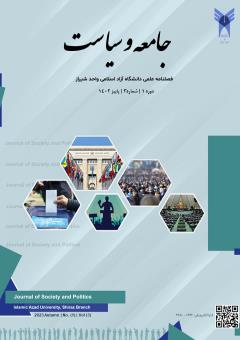Anthropological study of local knowledge of traditional architecture of Ardabil people with emphasis on ecotourism (A case study of the house of Iki room in the corridor of Aleli village)
Subject Areas : political sociology
ammar ahmadi
1
![]() ,
vahid rashidvash
2
*
,
vahid rashidvash
2
*
![]() ,
یعقوب شربتیان
3
,
mohammad hadi mansour lakoorej
4
,
یعقوب شربتیان
3
,
mohammad hadi mansour lakoorej
4
1 - Ph.D. student of Anthropology, Islamic Azad University, Central Tehran branch
2 - Assistant Professor of Anthropology, Central Tehran Branch, Islamic Azad University, Tehran, Iran
3 - گروه علوم اجتماعی،واحدگرمسار،دانشگاه آزاد اسلامی،گرمسار،ایران
4 - assistant professor of anthropology، central Tehran branch، islamic azad university، Tehran، iran
Keywords: Native knowledge, allele, architecture, traditional houses, ecotourism,
Abstract :
The main goal of this research paper is to know the local knowledge of traditional architecture with ecotourism orientation among the people of Aleli village in Meshkinshahr. The research method of this applied research is based on field research based on deep field analysis, which uses the theory of transautomatism in the school of architecture and the theory of needs in the school of functionalism, as well as the school of structuralism in the anthropological analysis and interpretation of the problem. The innovation and innovation of this research article lies in the rarity of this group of articles, in other words, the void of this research in the field of local knowledge, especially the local knowledge of the traditional architecture industry in the rural areas of the country, especially the rural areas of Ardabil province, was completely felt. The result of this research is to identify and preserve and maintain the traditional houses of the villages of different regions of Ardabil and the culture related to its construction and use, as well as the development of the traditional architecture industry in the structure of its local knowledge to help with the issue of ecotourism and attract tourism to rural areas, especially Aleli village of Meshkinshahr. . The obvious function of this indigenous knowledge manifests itself in the daily life of the people of Aleli village as the traditional architecture of this region in earning income and the economic prosperity of the families of this village and the hidden function…
1- ازکیا، مصطفی(1394). توسعه پایدار روستایی، تهران: انتشارات اطلاعات.#2- ازکیا، مصطفی(1389). روش های کاربردی تحقیق. تهران: انتشارات کیهان.#3- پورایمان، قاسم(1380). مشکین شهر نگین سبز آذربایجان، تهران: انتشارات مشیری.#4- جدی، منصور(1399). نام ها و نامیده های جغرافیایی منطقه اردبیل، اردبیل: انتشارات سپهر فروزان.#5- چایلی، صمد(1384). نگاهی به واژه های اساطیری آذربایجان، تبریز: انتشارات اختر.#6- زارع شاهمرسی، پرویز(1387). فرهنگ شاهمرسی ترکی-فارسی، تبریز: انتشارات اختر.#7- فکوهی، ناصر(1392). تاریخ اندیشه و نظریه های انسان شناسی، تهران: انتشارات نی.#8- فکوهی، ناصر(1397). پاره های هنر، معماریث و شهر، تهران: کتابکده کسری.#9- معماریان، غلامحسین(1401). سبک شناسی معماری ایرانی، تهران: انتشارات گلجام.#10- مور، جری دی(1391). زندگی و اندیشه بزرگان انسان شناسی، ترجمه هاشم آقابیگ پوری، تهران: انتشارات جامعه شناسان.#11- نجفی پور، امیرعباس(1398). اکوتوریسم و توسعه پایدار گردشگری روستایی، تهران: انتشارات نور علم.#12- همزه ای، فریبرز(1396). هورامان، جایگاه دانش بومی در توسعه پایدار، کرمانشاه: انتشارات دانشگاه رازی.#1- بوذرجمهری. خدیجه(1382). جایگاه دانش بومی در توسعه روستایی پایدار. تهران: مجله جغرافیا و توسعه. شماره7. پاییز و زمستان. ص20-5.#2- بوذرجمهری. خدیجه(1384). تحلیل جایگاه دانش بومی در توسعه روستایی. تهران: فصلنامه مدرس علوم انسانی. شماره1. سال9. بهار. ص45-17#

